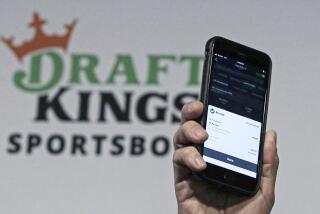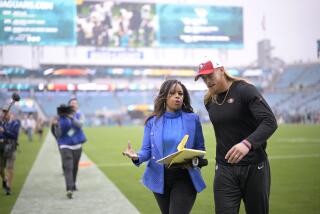Supreme Court rules against NFL in antitrust case
- Share via
Reporting from Washington — The National Football League is not a single business shielded from the antitrust laws, the Supreme Court ruled Monday, dealing a setback to sports leagues, which seek to closely control the marketing of their teams and their spin-off products.
The 9-0 ruling leaves the owners of most pro sports teams subject to being sued if they agree among themselves to restrict competition between the teams over their sale of merchandise.
The ruling reinstates an antitrust suit filed by a suburban Chicago maker of stocking caps, which lost its right to use NFL logos on its caps.
Ten years ago, the NFL gave Reebok an exclusive license to sell caps and hats with team logos. American Needle, the suburban Chicago firm which lost out, argued the deal hurt consumers and competition. Afterward, prices of hats spiked upward, the firm contended.
But a judge in Chicago and the 7th Circuit Court of Appeals tossed out the antitrust suit on the grounds that the NFL was a “single entity” and cannot be accused of conspiring with itself.
The Supreme Court disagreed. In American Needle vs. the NFL the court ruled that the owners can sometimes be sued if they conspire among themselves to restrict competition.
“Each of the [32] teams is a substantial, independently owned and independently managed business,” wrote Justice John Paul Stevens. “Decisions by NFL teams to license their separately owned trademarks collectively and to only one vendor are decisions that deprive the marketplace of … actual or potential competition,” he said.
When the case reached the Supreme Court, the NFL players and coaches joined on the side of American Needle, the cap maker. They feared that if the league were deemed to be a single business, the owners could agree among themselves on a plan to limit salaries. The court’s ruling appears to put those fears to rest.
But the decision is not a total defeat for the NFL. Stevens said the owners had valid reasons for cooperating on many fronts to assure the success of the league.
“The fact that NFL teams share an interest in making the entire league successful and profitable, and that they must cooperate in the production of and scheduling of games, provides a perfectly sensible justification for making a host of collective decisions,” Stevens wrote.
In the end, the court did not set a clear rule. It said judges must decide whether agreements among the independent teams are reasonable, or instead amount to an unreasonable restriction on competition.
The justices sent the case back to Chicago for judges to decide on American Needle’s complaint that the Reebok deal was an unreasonable restriction on competition.
More to Read
Go beyond the scoreboard
Get the latest on L.A.'s teams in the daily Sports Report newsletter.
You may occasionally receive promotional content from the Los Angeles Times.











